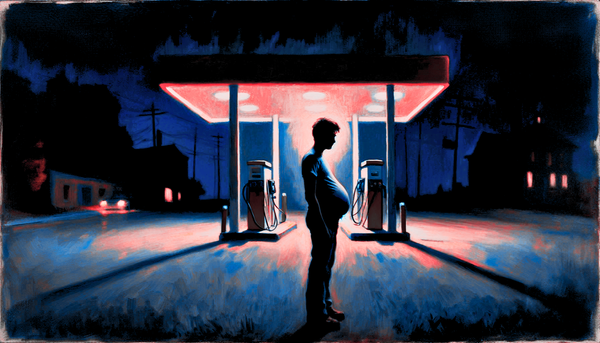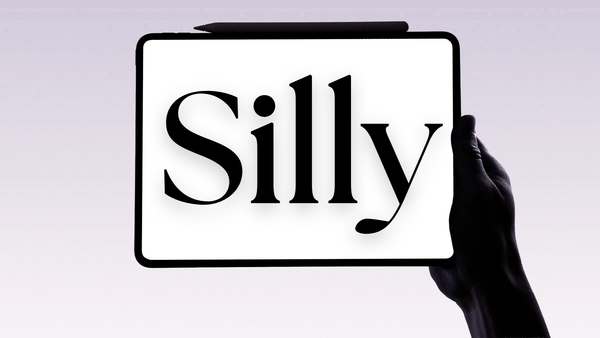Projection Games: The Invisible Puzzle Your Brain Can’t Resist
Your mind’s invitation to play with shadows and whispers

What happens when a sentence offers you everything except the thing you’re meant to see? Let’s explore this question by redacting key words from a short AI-generated narrative. The aim isn't so much to hide meaning as to expose the process by which it's made.
After all, when faced with gaps, our minds tend to reach. They interpret, assume, and fill in the blanks.
Reading becomes projection. The story becomes unstable: shaped less by what’s written and more by what you imagine. This act of imagination is where the true narrative lives.
The Quiet After
The wake had been Leo’s idea. She would’ve wanted it casual, he’d insisted, though Jamie knew it was really about Leo’s [REDACTED].
They’d held it at the [REDACTED]—Maggie’s favorite place, if you didn’t count the years she’d spent trying to escape it. Now her ashes sat in a tasteful jade urn on the mantel, watching as her brother and husband navigated the minefield she’d left them.
Jamie was thirty-eight. Leo was [REDACTED]. Maggie had been the hyphen between those numbers for years.
"Need help with the coolers?" Leo asked, appearing in the kitchen doorway. He’d forsaken the suit for a rumpled linen shirt, sleeves rolled to expose [REDACTED].
Maggie used to joke that he’d been born middle-aged, all tweed and caution. Jamie, rinsing wine glasses in the sink, felt seventeen again—the summer he’d spent here as Maggie’s college boyfriend, Leo, watched him like a librarian monitoring a patron with overdue fines.
"They’re already in the truck." Jamie’s wedding band clicked against the faucet. Her truck, technically. Leo had started driving it after [REDACTED].
A log shifted in the fireplace. Downstairs, their remaining guests—Maggie’s book club ladies, Leo’s department colleagues—[REDACTED]. Someone had put on a Billie Holiday record. Wrong decade, but Maggie would’ve laughed at the melodrama.
Leo hovered. He always [REDACTED]. Jamie turned, drying his hands on a dish towel embroidered with Maggie’s initials. "Should check the guest cabin before we lock up. Remember the raccoons last fall?"
"Right." Leo rubbed his jaw.
The path to the cabin glittered with frost. Jamie zipped his coat over his funeral suit, breath pluming. Leo walked too close, their elbows brushing. Always [REDACTED], these past few months.
A hand on the [REDACTED] during paperwork. Squeezing his knee under the table at the lawyer’s office. Small violences disguised as comfort.
The cabin smelled of mildew and Maggie’s [REDACTED]. She’d kept a vanity here, strewn with lipsticks and dog-eared Mary Oliver paperbacks. Jamie flicked the light switch. Nothing. "Fuse must’ve blown."
Leo struck a match. The flame trembled in his cupped hand, casting shadows over the sagging bed where Maggie used to nap after [REDACTED]. Jamie’s stomach tightened. He moved to check the bathroom window latch. Leo’s reflection loomed in the [REDACTED] behind him.
"You’ll stay in town awhile longer?" Leo’s voice had gone gravelly. Grief or [REDACTED] or both.
"Flight’s tomorrow." Jamie’s throat ached. He hadn’t cried yet. Not when the hospice nurse removed the IV, not when the lawyer read the will.
He’d cried plenty before, though—those secret nights in the hospital parking garage, Leo’s hand gripping the back of his neck. We’ll get through this, he’d said, and Jamie had almost believed him.
The match died. Darkness pooled.
The [REDACTED] began as habit—Leo’s arms sliding around him, the way they had at the funeral home, the [REDACTED], the endless meetings with estate agents. But this time, Jamie didn’t step back.
Leo’s exhale [REDACTED]. His palms spread across Jamie’s shoulder blades, thumbs pressing the notches of his spine. Too intimate. Too knowing. Jamie’s nose brushed Leo’s [REDACTED].
A decade’s worth of Christmas mornings flashed through him—Leo handing him coffee, their fingers avoiding contact. Maggie, [REDACTED] from the staircase in her ridiculous reindeer socks. Look at my boys playing nice.
They’d stopped [REDACTED]. Jamie wasn’t sure when they’d started. Somewhere outside, a branch snapped. Leo’s hands slid lower. Jamie’s pulse thundered in his wrists, his [REDACTED]. He should pull away. He should—
A car door slammed. Voices echoed up the path. They sprang apart like teenagers caught [REDACTED]. Leo fumbled for another match. The flame revealed his face—flushed, eyes glassy. Jamie stared at the [REDACTED]. Maggie’s hairbrush still held strands of her silver-blonde hair.
"We should—" Leo gestured weakly toward the main house.
"Yeah."
They didn’t speak on the walk back. The guests were leaving, taillights cutting red gashes through the pines. In the morning, Jamie would board a plane to another life. Leo would remain here, [REDACTED].
At the front door, Leo grasped Jamie’s elbow. His thumb found the hollow beneath the sleeve. [REDACTED]. Jamie let the contact linger for three breaths—two too many—before gently extracting himself.
"Safe travels," Leo rasped.
Inside, the urn watched. Jamie pressed his palm to the jade, still warm from the fireplace. He’d read somewhere that unresolved [REDACTED] lives in the larynx. Maggie would’ve rolled her eyes. Drama queen, she’d say, reaching to ruffle his hair. But Maggie wasn’t here.
Only the ghosts of choices not yet made.
Projection: The Hidden Player in Every Sentence

The exciting part is that the story you’ve just read is fairly unique to you. The strategic redactions maintain narrative coherence and work symbolically. This means that, rather than simply decoding meaning, you have constructed it.
Notice how your mind compensated for the gaps. Which ones felt obvious? Did any of them shift depending on your mood, memory, or experience?
At its core, this experiment shows how we read between the lines: not just because of what’s missing, but in spite of it.
Linguistic Note: Your Brain’s Meaning Hack
When you come across gaps or redacted sections—like the “[REDACTED]” here—your mind doesn’t just guess randomly. It uses a clever process called contextual inference, drawing on clues, prior knowledge, and expectations to fill in missing meaning.
Psycholinguistics and pragmatic theory show that communication depends on more than what's explicitly said; it’s also about what’s implied, assumed, or left unsaid. Our brains work a bit like detectives, piecing together incomplete signals to create a coherent narrative.
This process also naturally involves projection: we superimpose our own experiences, biases, desires, and emotions onto the gaps. As a result, meaning is partly shaped by the speaker/writer, and partly by the listener/reader.
And so, the experiment highlights the audience's active role in meaning-making, reminding us that ambiguity isn’t a deficiency but fertile ground for connection and interpretation.
Final Thoughts: When Meaning Slips Through the Cracks
If you found yourself filling in the blanks, that’s not just a reading habit; it’s how we navigate the world. Whether we’re looking at a sentence, listening to someone speak, or watching a flicker of expression cross a face, we’re always interpreting.
We lean on values, tone, emotion, context, and experience to make meaning—often without even realizing it. This is why there’s no such thing as a fixed reality: everyone’s perception and experience of the world is different.
The question isn’t just what you see or hear, but what you add without noticing—where exactly your assumptions step in, shaping the version of events you cling to.




